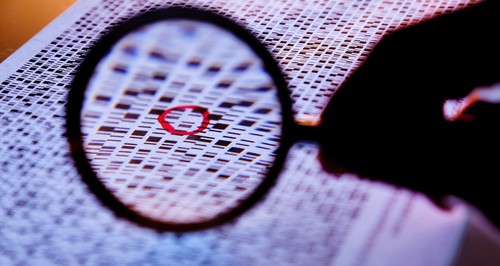
Researchers have uncovered a new gene mutation that is strongly linked to the development of breast cancer. The findings, reported in a new study in the journal Nature Genetics, add to our current understanding of the causes of hereditary breast cancer and could pave the way for new approaches to preventing and treating the disease.
Breast cancer is the most common cancer in women worldwide. In 2012, almost 1.7 million women were diagnosed with the disease, accounting for around 12 percent of all new cancer cases.
It is estimated that around 5-10 percent of all breast cancer cases are hereditary, resulting from mutations in genes passed down from a parent. The most common cause of hereditary breast cancer is an inherited mutation in the BRCA1 and BRCA2 genes. Women with BRCA1 mutations have a 55 to 65 percent chance of developing the disease, while the average risk of breast cancer among women with BRCA2 mutations is around 45 percent.
A number of other gene mutations have been associated with hereditary breast cancer, including mutations in the ATM, CHEK2 and TP53 genes. However, it is believed that to date, researchers have only discovered half of the gene mutations associated with breast cancer development.
Now, it is possible that another one can be added to the list: According to research led by Dr. Mohammad Akbari of the University of Toronto and the Women’s College Research Institute in Canada, mutations in a gene called RECQL are “strongly linked” with onset of breast cancer among Polish and French-Canadian women.
50 percent of women with RECQL mutation will develop breast cancer
To reach their findings, the team used a technique called whole-exome sequencing to analyze around 20,000 genes among 195 Polish or French-Canadian breast cancer patients who had a strong family history of the disease but who were free of BRCA1 and BRCA2 mutations.
The researchers chose Polish and French-Canadian women for the study because they are very similar genetically. In both of these populations, the researchers identified rare recurrent RECQL mutations.
In order to confirm that RECQL mutations were linked to onset of breast cancer, the researchers assessed the genes of an additional 25,000 Polish and French-Canadian women with or without breast cancer.
Based on this analysis, the team identified specific, recurrent RECQL mutations among both populations that were associated with greater breast cancer risk. For example, they found one RECQL mutation in Polish women that was linked to a fivefold increased risk for breast cancer, compared with Polish women without this mutation.
In the French-Canadian women, the researchers identified a RECQL mutation that occurred 50 times more often among those with a family history of breast cancer than those without a family history of the disease.
The researchers note that although these RECQL mutations seem to be rare, the risk of breast cancer among women who have them appears to be very high. In their study, they calculated that a startling 50 percent of women with a RECQL mutation would develop breast cancer.
Based on their findings, the researchers concluded that RECQL is a breast cancer susceptibility gene, describing the results as “an exciting step in identifying all of the relevant genes that are associated with inherited breast cancer.” Next, the team plans to search for the presence of RECQL mutations among women from other populations to determine if the associated risk is the same.
Currently, genetic testing is only recommended for breast cancer patients with specific risk factors such as familial patterns of breast and ovarian cancer, early-onset breast cancer, and/or multiple primary cancer sites. However, Dr. Akbari says he supports screening for genetic mutations among all women with breast cancer, as identifying such mutations could aid treatment for the disease.
“In the future, we might be able to select or develop treatments that can work around or correct relevant genetic mutations that are linked to breast cancer,” he adds. “This opens the door for new and better ways of approaching treatment.”
